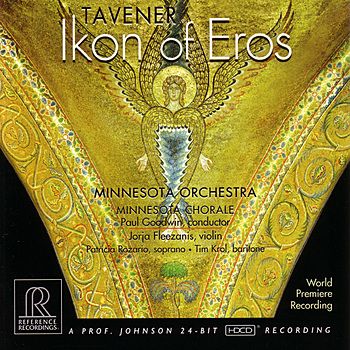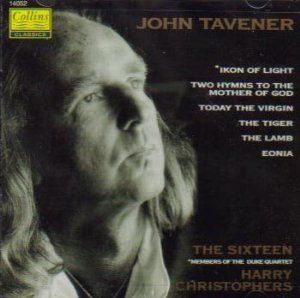Tuesday, November 12, 2013
Sir John Tavener
Every age has its outstanding artists. But among those are few who seem to listen to their inner voices more than to their time and place. Even fewer are those who can convey to a wide audience what stirs in their souls. Sir John Tavener (1944-2013), who passed over yesterday, was one of those. His musical accomplishment was both intensely personal and intensely impersonal, opening vistas in sound that we are deaf to until they are revealed.
Like most listeners, I discovered his music through his popular (well, "popular" as things go in the world of classical music) The Protecting Veil. It was astonishing to find a contemporary composer who seemed to ignore the kind of stuff written by academics in their nests as "composers in residence" at universities, but instead anchored his aesthetic in the traditions of worship.
Tavener, an Englishman, was famously a convert to Orthodox Christianity, and his work obviously has a kinship with Orthodox church music. There were other influences, including a difficult life, which involved dodgy health; he nearly died of a heart attack in 2007. If anything his worldly misfortunes seem to have further driven him toward transcendence.
I have collected quite a few recordings of Tavener's music. Tonight, after reading of his departure from this world, I listened to Svyati, for string orchestra and chorus, and The Hidden Treasure, for string quartet with Steven Isserlis playing the cello part. (He has attracted star-quality musicians to perform his compositions.)
Reading the obits in The Guardian and The Telegraph, I was surprised to learn that he first attracted attention in the '60s as a conventionally rebellious author of -- in the words of Tom Service, writing in The Guardian -- pieces that were "tumultuous, chaotic, modernist, and radical." Equally surprising is the large number of works he has created since then in his Orthodox-influenced phase. I look forward to getting acquainted with those I don't know.
The pianist Artur Schnabel said that Beethoven's last sonatas were greater than they could be played. In a sense that is true of what Tavener has given us. No music, Beethoven's or his, can fully represent infinite longings. Tavener's seems ancient, but without a touch of antiquarianism -- he uses the full resources of modern instruments and performers. Yet we are not listening either to now or any past "now." The eternal has cracked the shell of time.
John Tavener. Rest in peace, and in the music of God.
Subscribe to:
Post Comments (Atom)




No comments:
Post a Comment